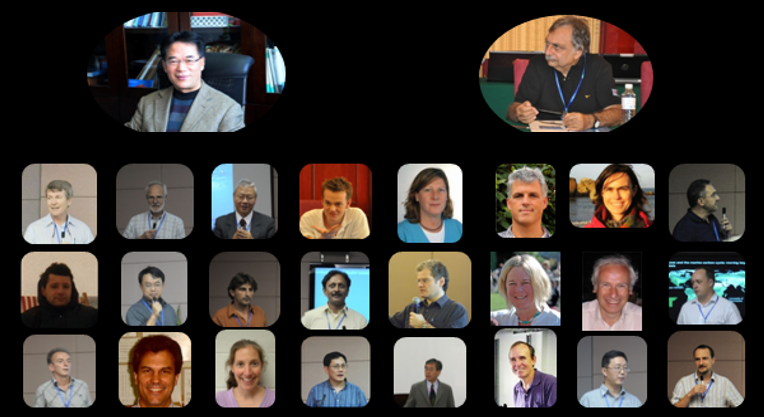
Scientific Committee on Oceanic Research (SCOR) working group on the Microbial Carbon Pump (MCP) in the Ocean co-chaired by Prof. Nianzhi Jiao from Xiamen University, China and Prof. Farooq Azam from Scripps Oceanography Institution, USA, and joined by 12 countries including China, USA, Germany, UK, France, Canada, Spain, the Netherlands, Denmark, Czech, India and Korea. The WG134 was approved by the SCOR at its 50th anniversary in 2008, and was active until 2014.
Utilization of the labile dissolved organic carbon (DOC) and the production of refractory DOC by heterotrophic prokaryotes can shape the chemical composition of organic carbon and thereby influence the residence time of the carbon in the ocean. This process is analogous to the known “biological pump”. To better understand the microbial processing of carbon and its impacts on the oceanic carbon sequestration, microbiologists and biogeochemists need to work together to bridge the fields of microbial ecology and organic biogeochemistry. The working group 134 documented the state of the art in the microbial processing of organic carbon and acquired new insights through analyzing the available data on microbial biomass, production and diversity along with dissolved organic matter (DOM) data from a variety of marine environments. The goal of the WG134 was to identify the priority scientific questions; provided corresponding technical supports, and established or standardized protocols for the observations of key microbial and DOM parameters to advance interdisciplinary research on the microbial carbon pump in the ocean. Overall, after the nearly 5-year integrated research and activities, a novel carbon sequestration concept, microbial carbon pump (MCP) was established with the publication of a featured article in Nature Review Microbiology (2010). Not long after the publication of the MCP theory, a Science News Focus article (SCIENCE 328:1476-1477, 2010) addressed another story about the MCP: its origin, rationale, implications, applications, impacts, and prospects, and the MCP is considered as “An invisible hand behind the vast carbon reservoir”.
Terms of Reference
Summarize representative microbial data on biomass, production and diversity of functional groups and overall microbial communities in the context of DOC dynamics along environmental gradients (productivity/temperature/salinity gradients such as estuarine to oceanic waters).
Establish the current state of knowledge about microbial processes that utilize, generate and transform DOC, and identify essential scientific questions and suggest hypotheses regarding DOC accumulation through the microbial carbon pump.
Identify the gaps in our understanding of marine DOC and the microbial community structure in different marine regions regarding bioactivity and storage of DOC.
Document state-of-the-art techniques and parameters addressing microbial processing of organic carbon.
Establish/standardize key protocols for the essential observations/measurements.
Convene International Workshop(s) and publish a special volume in an internationally recognized peer-reviewed journal, or a protocol book (practical handbook) by a major publisher on measurements of the key parameters related to microbial processing of carbon in the ocean.
Make recommendations for future research related to the microbial carbon pump in the ocean, toward development of a large-scale interdisciplinary research program.
